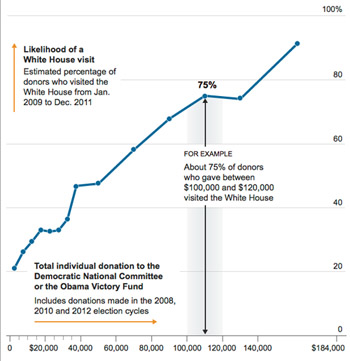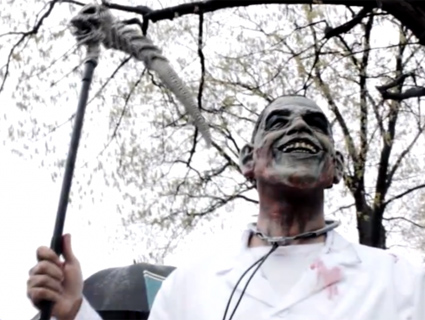
<a href="http://www.flickr.com/photos/hikingartist/5727282498/">Frits Ahlefeldt-Laurvig</a>/Flickr
A quick look at the week that was in the world of political dark money…
CU Later? Vermont legislators passed a resolution calling on Congress to draft a constitutional amendment that would undo the Supreme Court’s Citizens United ruling. (New Mexico and Hawaii have passed similar measures.) On Wednesday, Democratic senators held a rally where they expressed their support for such an amendment. New York Sen. Charles Schumer said the 2010 ruling was “the worst decision since Plessy v. Ferguson.” He also suggested that bitter rivals Thomas Jefferson and Thomas Hamilton would have agreed on taking down Citizens United: “They’d say, ‘Go forward, right on, because our democracy is being ruined by these decisions.'”
The price of a White House visit: The New York Times reports that major donors have been made welcome at the White House. Around 75 percent of donors who gave $100,000 to Obama and the Democratic party have visited, and approximately two-thirds of the president’s top 2008 fundraisers have visited. Many of the visitors showed up with the Washington equivalent of a bottle of wine for the hosts—a lobbyist.
 New York TimesAttack ads on Antiques Roadshow? Last week, the 9th Circuit Court of Appeals struck down a longstanding ban on political advertising on public TV. So what does the ruling really mean? Short answer: PBS stations can accept (or turn down) political ads—assuming that candidates would even want to advertise there in the first place.
New York TimesAttack ads on Antiques Roadshow? Last week, the 9th Circuit Court of Appeals struck down a longstanding ban on political advertising on public TV. So what does the ruling really mean? Short answer: PBS stations can accept (or turn down) political ads—assuming that candidates would even want to advertise there in the first place.
Rove’s $100 million money machine: Karl Rove’s American Crossroads super-PAC and Crossroads GPS 501(c)4 are expected to announce that they’ve raised nearly $100 million in this election cycle, Politico reports. Of the $28.4 million brought in by Crossroads GPS, $10 million, or 35 percent of its haul, has come from one person or corporation. Who that megadonor might be is a mystery, since GPS doesn’t have to disclose the identity of its donors.
The sleeper super-PACs: Big national-level super-PACs like Crossroads have been getting a lot of attention, but the Sunlight Foundation reports that smaller groups are already having an impact on the state level.
Energy ad war heats up: The American Energy Alliance, a Koch-funded pro-oil advocacy group, has been taking to the airwaves in swing states with the ad below, which slams Obama’s “failing energy policies.” It’s just one of several groups that have spent nearly $17 million attacking the president’s energy record. Meanwhile, the Obama’s campaign and super-PAC have spent just one-tenth that touting his record on one of the campaign’s most contentious issues.











